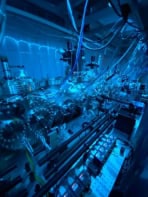Peter Higgs has always been reluctant to be exclusively associated with the boson that bears his name. In this special audio interview, he argues that others deserve the credit too
Peter Higgs is not someone who craves the limelight. He lives a quiet life in a flat in Edinburgh, the city where he spent the bulk of his academic career as a particle theorist, and rarely ventures into TV or radio studios to pontificate on the frantic hunt at CERN and Fermilab for the boson that bears his name. If anything, the 83-year-old Higgs is acutely embarrassed by the term “the Higgs boson”, which – he feels – singles him out at the expense of other theorists who were also involved in conceiving the core ideas that led to its prediction.
But while Higgs does not like to crow too much about himself, he is by no means some sort of recluse. Indeed, Higgs was delighted to give this special audio interview to Physics World while visiting Bristol last month as part of a series of other speaking engagements in the city. In the interview, he emphasizes that at least five other theorists – Robert Brout, Francois Englert, Gerald Guralnik, Carl Hagen and Tom Kibble – deserve credit for predicting the Higgs boson, adding that “the person who is still slightly aggrieved is Phil Anderson, the condensed-matter theorist, who said he knew it all already”.
Higgs also talks about how the Higgs boson came to be so named, what his current research interests are, why he holds no particular religious views – and what he thinks is the best analogy anyone has ever made for the Higgs boson. “The one I object to least is the one used by David Miller,” says Higgs, referring to the University College London physicist who wrote one of the winning entries in a 1993 competition set by then UK science minister William Waldegrave, after the latter asked physicists to explain – on one sheet of A4 paper – what the Higgs boson is and why it needed to be found.
Miller famously likened the boson to former British prime minister Margaret Thatcher moving through a crowded room, gaining mass as other people congregate around her. “I do object when people draw an analogy with dragging something through treacle,” Higgs points out. “That’s [a] dissipative [process] and this isn’t.” If CERN announces next week that a Higgs boson has been officially “discovered”, you can be sure that Higgs will have to put up not just with woolly analogies, but also with the world’s spotlight being on him once again.



